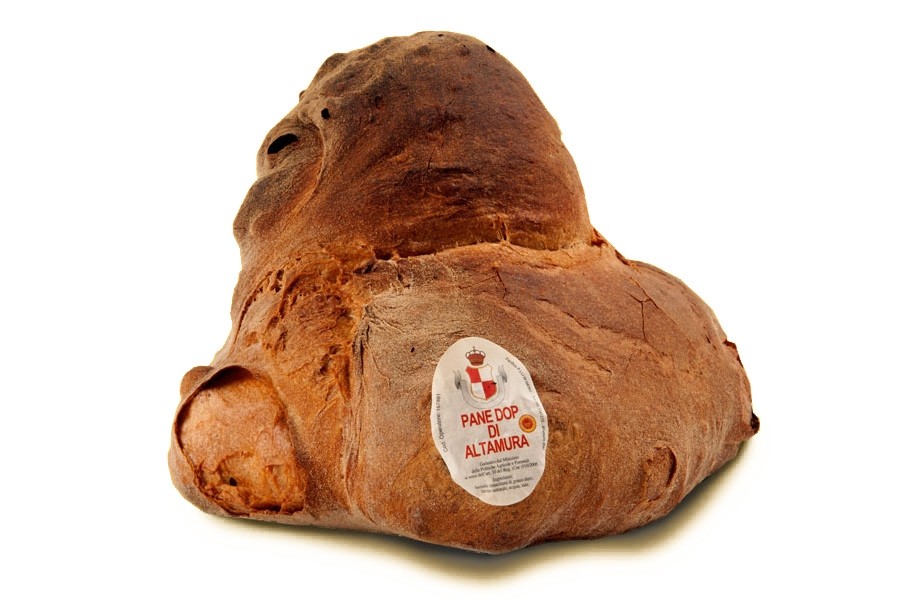Altamura Bread PDO
Product Description Altamura Bread D.O.P.
Altamura D.O.P. Bread is a bakery product made from a mixture of re-milled durum wheat semolina, sourdough or sourdough starter, sea salt, and water.
Altamura Bread D.O.P. Production Method
The sourdough starter is renewed at least three times by adding water and durum wheat semolina to increase the fermented mass. The ingredients are mixed using a mixer for 20 minutes. The dough is then covered with a thick cotton cloth to allow for uniform temperature fermentation and left to rest for at least 90 minutes. This is followed by weighing and two phases of manual shaping, separated by additional resting periods of 30 and 15 minutes. The dough is first inverted and then placed in a wood-fired or gas oven at a temperature of 250°C (482°F). The initial 15 minutes of baking occur with the oven door open, after which the oven door is closed, and baking continues for another 45 minutes. At the end of baking, the bread is left in the open oven for at least five minutes to allow steam to escape and the crust to become crisp.
Appearance and Flavor Altamura Bread D.O.P.
Altamura D.O.P. Bread is presented in the traditional "Accavallata" (skuanete) form with "kisses" on the sides, or the "Bassa" (a cappidd d’prevte) form without "kisses," weighing at least 500 g. The crust is 3 mm thick. The crumb is soft, straw-yellow in color, and with uniform alveolation. It has a characteristic aroma.
Gastronomy Altamura Bread D.O.P.
Altamura D.O.P. Bread can be stored for several days in a cool, dry place. It's excellent when consumed on its own, sliced and drizzled with extra virgin olive oil, salt, and sometimes even tomatoes. It can be used in appetizers or paired with various dishes. There are many traditional recipes, such as "cialde" with tomatoes, onions, potatoes, and olives; "fetta francesca" made with stale Altamura D.O.P. Bread sliced, soaked in milk, and enriched with mortadella, cheese, mozzarella, and eggs, then baked.
Marketing Altamura Bread D.O.P.
The product is available on the market year-round under the category Altamura D.O.P. Bread in the Accavallata and a Cappello di Prete forms. It is sold fresh in loaves weighing no less than 0.5 kg. The finished product can be packaged in microperforated shrink-wrap with a recognizable label for the distinctive mark of Altamura D.O.P. Bread.
Distinctive Note Altamura Bread D.O.P.
Altamura D.O.P. Bread is considered of "unique" quality because the hard grains used, corresponding to at least 80% of the Appuro, Arcangelo, Duilio, Simeto varieties, are produced in the area with specific geographic and environmental factors. The water used must also meet potability and certification requirements.
History Altamura Bread D.O.P.
There are numerous written testimonies about the origin and reputation of this particular bread. Pliny, for example, referred to it as "the best bread in the world." Of ancient local origin, in the traditional Accavallata form, Altamura D.O.P. Bread had notably sized portions and was mainly mixed and processed within domestic walls. The loaves were then baked in public ovens, where recognition was achieved through marking the loaves with the initials of the head of the family. The city of Altamura reports bread-making activities in its Municipal Statutes of 1527, which include documents related to the "oven duty." It is also known that in the early 1600s, there were 26 milling facilities in the Altamura area, confirming the widespread production of this product and its origin in an agrarian society.
Production Area Altamura Bread D.O.P.
The production area of Altamura D.O.P. Bread extends to the territories within the Alta Murgia National Park, in the municipalities of Altamura, Gravina di Puglia, Poggiorsini in the province of Bari, and Spinazzola, Minervino Murge in the province of Barletta-Andria-Trani, in the Puglia region.
Production Specification - Altamura Bread D.O.P.
Article 1.
The protected designation of origin "Altamura Bread" is reserved for bread that meets the requirements and conditions set by Regulation (EC) No. 2081/92 and the provisions imposed by this production specification.

 IT
IT 